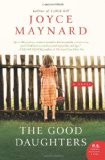Summary | Excerpt | Reading Guide | Reviews | Beyond the Book | Readalikes | Genres & Themes | Author Bio

A Novel
by Joyce Maynard
Back in the days of reel-to-reel tapes, he created a recording studio to work
on his demos, in what had been the garage of the house we rented, this time in
Connecticut. I wasn’t sure the owner of the house would appreciate it that my
father cut a hole in the garage door to let in more light, never mind what he was
going to do in wintertime, when it would get pretty chilly in that uninsulated
garage.
By winter the checks would have started rolling in, George told me. Then
he could get himself a real place to work on his music, and things like an electric
organ. We might even move to Nashville, he said. That’s where the action was
in country music.
Even then, I knew this wasn’t happening, as did Val and my brother probably,
though I was the one in the family with the firmest grasp on reality. Even as
a kid, I always had the ability to see down the line to where trouble lay, or truth.
George used to complain that I expected the worst out of life, but it wasn’t that.
I simply recognized that just because the sun was shining one day didn’t mean
it would the next. Frost would come, and so would snow. The fact of rain did
not rule out the possibility of drought. You could call it pessimism. I based my
attitudes on what I saw in the world around me. Not what I dreamed up.
“Dana has her feet firmly grounded on earth,” one of my teachers wrote about
me on a report card. I remembered this because to me it seemed like the nicest kind
of compliment, but I could see that for my mother, this was a disappointment.
“Don’t you ever want to use your imagination?” she said, but I was more
the type who based her thinking on what was real—the things I could touch
and see.
I was not one to believe, the way my father did, that things would always
turn out the way you wanted them to, or—like my mother—that we should
surround ourselves only with what was beautiful. Life wasn’t like that. Even as
a child, I knew and accepted this.
I think I always had an understanding of the seasons and recognized that all
of them—winter as much as summer, fall as much as spring—were necessary
to sustain the cycle of life. I might be the youngest, but I kept track of the bills.
Where the others whistled in the dark, I considered how we might get by in the
event of a worst-case scenario. From what I’d seen of the world, those were far
more likely to take place than the paydays George kept expecting.
I loved my brother, Ray. He was the only one in our family who showed me
a certain interest, for a while there anyway. But I understood that I was the only
truly reasonable person living under whatever roof happened to be sheltering us
that season.
Except for one uncle, we saw no relatives. No cousins. There was one
grandparent that I met one time and one time only. All I knew of my heritage
was George’s story: that his father had performed in silent movies, where he met
my grandmother—the woman, he told us, who had posed for that image we
saw at the beginning of every movie made by Columbia Pictures to this day. He
called her a legendary beauty of Hollywood. He said she could stop traffic with
her amazing body, well into her sixties.
Traffic? What traffic? My grandparents had lived in Vermont. Due to some
kind of falling-out that had something to do with my mother, though we never
got the details, I met my grandma only once, when I was five or six, but in distant
memory she was an ordinary-looking person who served us meat loaf and
called my father Georgie.
George was a fair-weather type. He wanted every day to be sunny, and
never believed, as long as it was, that the sky would ever darken again, as it
always did over the broad green horizons he imagined for us all. He liked the
idea of having children and being a father, but only long enough to cook up some
project for us, which he’d forget about shortly after.
Excerpted from The Good Daughters by Joyce Maynard. Copyright © 2010 by Joyce Maynard. Excerpted by permission of William Morrow. All rights reserved. No part of this excerpt may be reproduced or reprinted without permission in writing from the publisher.
Your guide toexceptional books
BookBrowse seeks out and recommends the best in contemporary fiction and nonfiction—books that not only engage and entertain but also deepen our understanding of ourselves and the world around us.